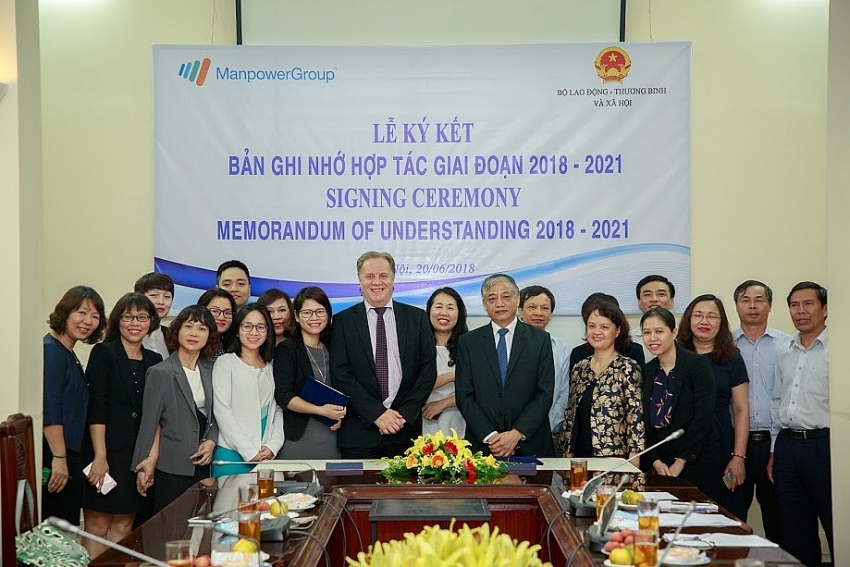ManpowerGroup helps Vietnam develop skilled workforce for Industry 4.0
 |
| Deputy Minister Doan Mau Diep and Simon Matthews, country manager for ManpowerGroup Vietnam, signing the MoU |
"The Industry 4.0 requires the Vietnamese labour market to improve its quality in a changing world of work. I believed the cooperation will contribute to developing the skilled human resources in Vietnam," said Doan Mau Diep, Deputy Minister of the MoLISA.
Under the MoU, between 2018 and 2021, the cooperation will focus on raising awareness of labour trends, employment and workforce development, international labour commitments on in the context of international integration and Industry 4.0.
The focuses are developing workforce through improving the knowledge and professional experience of the local workforce to adapt to the requirements of automation and digitization, providing the labour market information, analysing and orientation, while sharing experience of international labour markets, connecting and enhancing Vietnam's cooperation with other countries on labour, employment and human resource development.
According to Simon Matthews, country manager for ManpowerGroup Vietnam, in a rapidly changing world of work upskilling people for the jobs of the future and developing effective legal frameworks is critical to success for people, companies and governments alike.
“We are delighted to partner with the MoLISA to develop and execute a strategic plan to create Vietnam’s workforce of tomorrow and help people continue to access meaningful employment and companies find the talent they need to succeed in the digital age.”
Having established its offices in Vietnam in 2008, ManpowerGroup is the first 100 per cent foreign-invested firm in Vietnam’s human resources market, licensed by the government to provide outsourcing and sub-leasing services with two offices in Hanoi and Ho Chi Minh City. It celebrated its 10th anniversary last week.
The new MoU is the fourth one signed between the two sides since 2008 following the effective cooperation over the past ten years.
Vietnam’s workforce over the age of 15 is 53.5 million strong, but only 9.99 million people or 18.6 per cent are skilled workers, meaning unskilled workers make up 81.4 per cent of the country’s total workforce.
The local workforce also lacks many necessary skills like problem solving and IT, not to mention foreign language skills and adaptability. Moreover, innovation and creativity of the local skilled workforce is still low.
 | Profit figures mark significant impact of digital transformation Companies that embrace digital transformation are up to 26 per cent more profitable than their competitors and enjoy up to 12 per cent higher market ... |
 | ManpowerGroup optimistic about the future of work in Vietnam Vietnam’s demand for highly-skilled workers has been growing steadily, buoyed by increasing foreign investment inflow. |
 | KinderWorld: At the start of a better skilled workforce KinderWorld Education Group regards sustainability as a fundamental aspect of education investment and global standard human resources development in Viet Nam. Duc Hanh reports. |
What the stars mean:
★ Poor ★ ★ Promising ★★★ Good ★★★★ Very good ★★★★★ Exceptional
Related Contents
Latest News
More News
- Shopee and TikTok Shop account for 8 per cent of Vietnam’s retail market (January 16, 2026 | 00:00)
- Human-centred governance seen as key to AI development (December 19, 2025 | 18:19)
- TECHFEST Vietnam 2025 links startups with policy and capital (December 15, 2025 | 18:21)
- Long Thanh International Airport welcomes first Vietnam Airlines test flight (December 15, 2025 | 18:01)
- Foreign fruits flood Vietnamese market (December 09, 2025 | 13:22)
- Vietnam’s fruit and vegetable exports reach $7.8 billion in first 11 months (December 05, 2025 | 13:50)
- Vietnam shapes next-generation carbon market (November 26, 2025 | 15:33)
- PM urges Ho Chi Minh City to innovate and remain Vietnam’s economic locomotive (November 26, 2025 | 15:29)
- Experts chart Vietnam's digital finance path: high hopes, high stakes (November 14, 2025 | 10:56)
- Vietnam’s seafood imports surge 30 per cent in first 10 months (November 10, 2025 | 19:35)

 Tag:
Tag:























 Mobile Version
Mobile Version